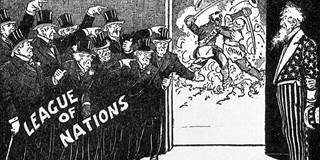When assessing Donald Trump’s place in the US political pantheon, few would put him anywhere near Franklin Delano Roosevelt. Yet by pursuing a narrowly focused domestic agenda with little mind to the international implications, Trump is emulating one of FDR’s most egregious political mistakes.
NEW YORK – Like a sunbather bent on improving his tan, US President Donald Trump’s policy of always putting “America first” entails long-term costs that could easily outweigh the short-term benefits. Economic nationalism and protectionism may produce immediate industrial gains in some sectors, but they can also lead to bad outcomes that go well beyond trading partners’ predictable retaliation.
A lesson from US President Franklin Delano Roosevelt’s New Deal programs in the 1930s helps to drive the point home. As with Trump today, part of Roosevelt’s strategy for boosting the US economy effectively singled out China. Examining that precedent closely reveals that when US policies are formulated with a view to the domestic context and pay little mind to international implications, the consequences can be disastrous.
Bullion in a China Shop
In December 1934, FDR’s Secretary of the Treasury, Henry Morgenthau, confessed to his friend William C. Bullitt, the US Ambassador to the Soviet Union, that “I was on the payroll of the Japanese [and] I’ve been earning my pay.” A disturbing statement by itself, Morgenthau’s intimation would seem all the worse for coming just a few years after Japan’s invasion of the Chinese province of Manchuria. But, of course, Morgenthau was not literally on Japan’s payroll. What he meant is that he might as well have been, having implemented a policy that left China vulnerable to Japanese aggression.

NEW YORK – Like a sunbather bent on improving his tan, US President Donald Trump’s policy of always putting “America first” entails long-term costs that could easily outweigh the short-term benefits. Economic nationalism and protectionism may produce immediate industrial gains in some sectors, but they can also lead to bad outcomes that go well beyond trading partners’ predictable retaliation.
A lesson from US President Franklin Delano Roosevelt’s New Deal programs in the 1930s helps to drive the point home. As with Trump today, part of Roosevelt’s strategy for boosting the US economy effectively singled out China. Examining that precedent closely reveals that when US policies are formulated with a view to the domestic context and pay little mind to international implications, the consequences can be disastrous.
Bullion in a China Shop
In December 1934, FDR’s Secretary of the Treasury, Henry Morgenthau, confessed to his friend William C. Bullitt, the US Ambassador to the Soviet Union, that “I was on the payroll of the Japanese [and] I’ve been earning my pay.” A disturbing statement by itself, Morgenthau’s intimation would seem all the worse for coming just a few years after Japan’s invasion of the Chinese province of Manchuria. But, of course, Morgenthau was not literally on Japan’s payroll. What he meant is that he might as well have been, having implemented a policy that left China vulnerable to Japanese aggression.